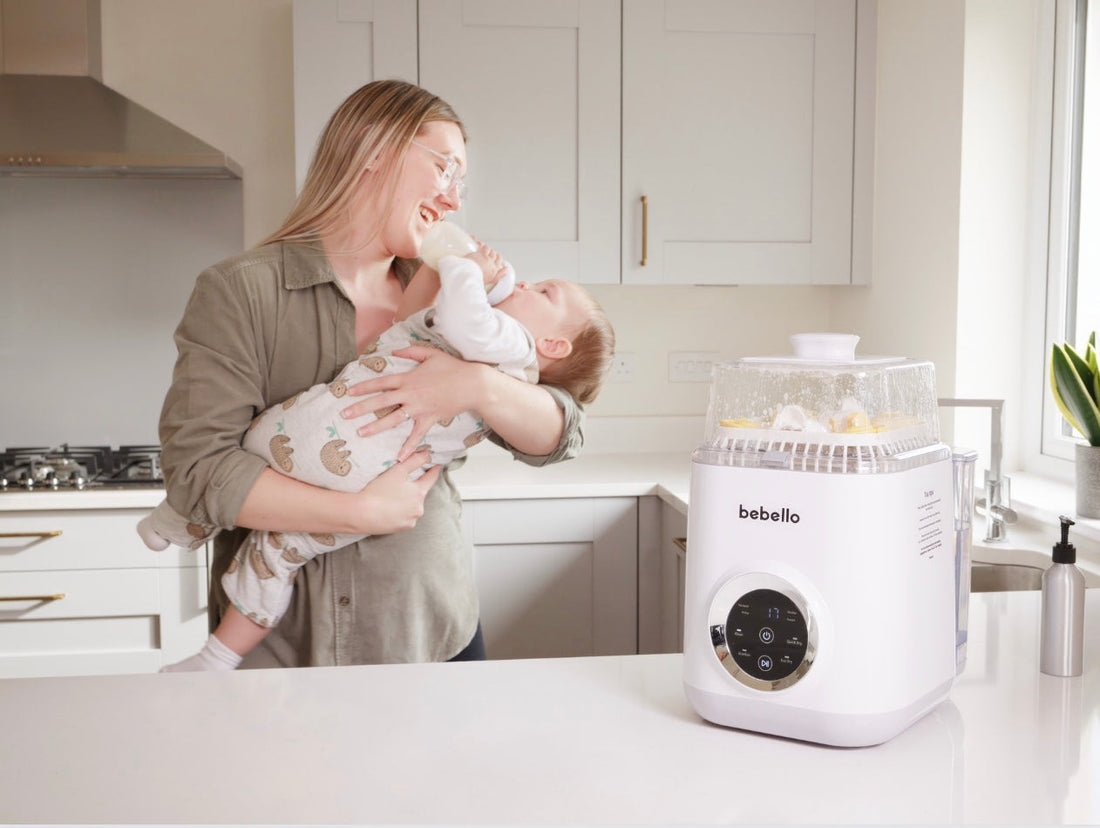Feeding your newborn is one of the most time-consuming aspects of being a new parent. Studies reveal that breastfeeding can take up to 40-60 hours per week - that’s more than most full time jobs! This is a significant commitment, but for those who are able to breastfeed their babies, it’s the healthiest choice available.
This article discusses the different methods for feeding your newborn and tips on how to save time throughout the process.
Breastfeeding
The benefits of breastfeeding are well understood. For mums who can breastfeed it’s also the most convenient: When your little one needs food, pop them on the boob. Simple!
But despite being the most time-efficient option, the eye-opening stat is that breastfeeding is a 40-60 hour time commitment every week. It is also important to note that some mothers may experience challenges, such as latching issues or milk supply concerns, which could require additional time and support.
Formula Feeding
Formula feeding is well understood and widely accepted in society. However, new parents often underestimate just how much time it takes to properly prepare formula and care for the necessary equipment.
Formula feeding can take as much time as breastfeeding, as it’s often in response to your baby’s hunger cues. However, additional steps are involved. You need to measure the correct amount of water and formula, sterilise the bottles, and ensure everything is clean and safe for feeding. On top of this, you must also account for the time spent cleaning, sterilising, and drying bottles and pump parts. Read about the importance of cleaning and sterilising breast pump parts here.
In total, formula feeding can add an extra 10 hours per week just for preparation, followed by another 10 hours for cleaning and sterilising. It’s easy to see how this method quickly becomes a seriously time-consuming task.
One helpful tip for new parents is that, in the early months, all formula brands must adhere to strict nutritional requirements. So, there is little to no difference between different brands when it comes to nutritional content.
The time-consuming part of formula feeding lies in the preparation of the milk for feeding, and the cleaning & sterilisation of bottles after feeding.
Time-Saving Tips for Formula Feeding
Here are a few time-saving hacks on how to prepare a bottle for a newborn which can help reduce your formula feed workload:
-
Formula Pitchers: Popular in the US, these pitchers such as the NaturalFlow from Dr Brown’s allow parents to prepare large batches of formula and store it in the fridge, so bottles can be quickly filled when needed. This eliminates the need to prepare formula every time your baby is hungry.
- Formula Prep Machines: Devices such as the Tommee Tippee Perfect Prep can make the bottle preparation process faster and easier. However, some concerns exist about the potential for bacteria growth when using these milk prep machines, so it's important to clean and maintain them properly.
- Efficient Cleaning Tools: Using products like the Bebello Baby Bottle Washer will make the cleaning and sterilising process much more efficient. This 4-in-1 baby bottle washer, steriliser, dryer & protector eliminates the need to hand wash altogether. There is no more need for pre-soaking bottles, scrubbing with baby bottle brushes, using a steam or cold water sterilisers. This significantly cuts down on the time spent washing and sterilising bottles and pump parts, saving new parents up to an hour per day.
- Formula coolers: Rapid cool milk formula prepared with boiling water to safe drinking temperature quickly. Examples include the Nuby Rapid Cool Flask.
-
Infant Milk warmer: Raise chilled milk from the fridge to drinking temperature quickly. Popular examples are the the Tommee Tippee or the Nuby bottle warmer,
Exclusive Pumping/Expressing Milk
Exclusive pumping is an option for parents who wish to give their baby breast milk but may not be able to breastfeed directly, whether due to work commitments, latching difficulties, or other reasons. It can also help relieve symptoms of engorgement.
Expressing milk is also a great way to get your partner involved in the feeding process. It also allows mum more freedom to get out and see friends or for rare baby-free nights off!
While exclusive pumping allows you to keep your baby on breast milk, it does come with its own set of time-consuming tasks. The process involves expressing milk, storing it, and then warming it when it’s time to feed, not to mention the need to wash, sterilise and dry your bottles and pump parts.
Much like formula feeding, exclusive pumping adds a lot of time to the baby feeding process when compared to breastfeeding.
Wearable pumps like the Elvie Stride 2 or Medela Freestyle hands free breast pump, make pumping hands-free and much more convenient than traditional pumps which require mums to sit down for 20-30 minute pumping sessions.
Conclusion
How you feed your newborn is often a decision made before their birth. In the UK, around 70% of mothers will breastfeed for the first six weeks, with the figure in Ireland at around 51%. As we’ve explained, there are significant time-saving advantages to this method, but for some parents breastfeeding just isn't an option, so pumping and formula must be considered.
For those who cannot or choose not to breastfeed, or simply wish to combine it with other methods, it’s worth considering the time-saving strategies we’ve provided above. By implementing these tips, you can streamline the feeding process, saving both time and energy as you navigate the early stages of parenthood.

